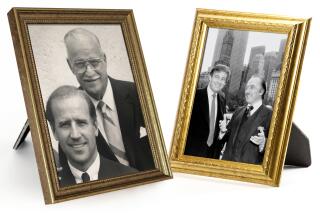Charity Begins at Home : Dad Has Always Been Good for a Handout, but His Charge Cards Really Fill the Bill
- Share via
MY HIGH SCHOOL classmate Jerry Luboviski, who was later my city editor at the San Diego Journal and the Los Angeles Daily News, both now defunct, has written to ask how we handled it when our sons wrote home for money.
Luboviski said he was prompted to recall how he and his wife, Bonnie, had dealt with this situation by a story in The Times on Dr. Benjamin Spock.
Spock said that his mother got him to write when he was away at school by wiring: “Write or don’t come home!”
Luboviski recalls that he and his wife had the same problem of one-way correspondence when their son, Mike, was away at UC Santa Barbara.
“Finally, Bonnie sent him a terse note: ‘No letter from you. No money from me.’ It worked, too. Were your kids away at school, and did a similar situation arise? I wonder what leverage other parents used.”
I remember an imaginary correspondence between a son and father that was a kind of joke in the 1930s. It probably came from the magazine College Humor:
“Dear Dad. No mon. No fun. Your Son.”
“Dear Son. How sad. Too bad. Your Dad.”
Keeping that in mind, I was always hesitant to wire or telephone (collect) my father for money when I was away. But sometimes the need for cash became urgent. I remember that, once, when I was in Honolulu on the beach, I wired my father for money to come home on.
“Need two hundred dollars.” (At that time you could buy a one-way ticket on the S.S. Lurline, cabin class, from Honolulu to San Francisco for $200.) I signed the wire DILLINGER, referring to the notorious John Dillinger, a bank robber and murderer who had been the FBI’s Public Enemy No. 1 and had been shot to death in front of a Chicago theater after “the woman in red” put the finger on him. His name was synonymous with lawlessness.
My father sent the money with a message: “Who’s Dillinger?”
Despite his question, I was sure he understood the significance of Dillinger as a confession of guilt. Otherwise, why would he have sent the money to me?
I realized later it was a good thing Dillinger was already dead or the FBI would have been on my neck.
My most excruciating appeal for money, though, came a few years later, when I was married and working for United Press at Sacramento in the Capitol Building. My wife and I had taken a weekend holiday in San Francisco, staying at the Manx Hotel. Before it became time to check out, I realized I did not have enough money to pay the bill.
I telephoned my sister in Los Angeles. No answer. I telephoned my UP boss in Sacramento. No answer. I couldn’t think of anyone I knew in San Francisco. We didn’t have a checking account. Finally, my wife remembered that a man who had once been sweet on her was now living in San Francisco.
We found him in the telephone book. He was at home. I explained our predicament. He came to the hotel. We had a drink. He loaned me $20. That was a lot of money in those days.
We paid our bill and took the train back to Sacramento. I didn’t own a car. When I could, I paid the $20 back.
That couldn’t happen today. We would simply put it on a credit card. No problem.
Obviously, young people away from home today don’t get in money scrapes. They don’t have to telephone or wire home for money. They put it on their credit cards. It isn’t hard to guess who pays the bills.
There is an American Express ad on TV that shows a fond father sending his daughter off to college with a gift of her very own credit card. His smiling face reflects the confidence he feels that everything will be OK with her. She will want for nothing.
The affluence of our times is demonstrated even more by a TV ad showing a father and mother seeing their daughter off to college in her brand new, very own Oldsmobile. It goes without saying that she will also have a credit card to buy gas and oil for it.
When I was in college, the only girl I knew who was lucky enough to have her very own car was a wealthy doctor’s daughter. It was a red convertible, and she was something to see when she rode through the campus in it. But for me, she was unattainable.
If I were in college today, I’d have my own credit card, and if a girl in a red convertible turned up, I’d be able to take her where she wanted to go. No problem.
And Dad would pay the bills.
That hasn’t changed.


